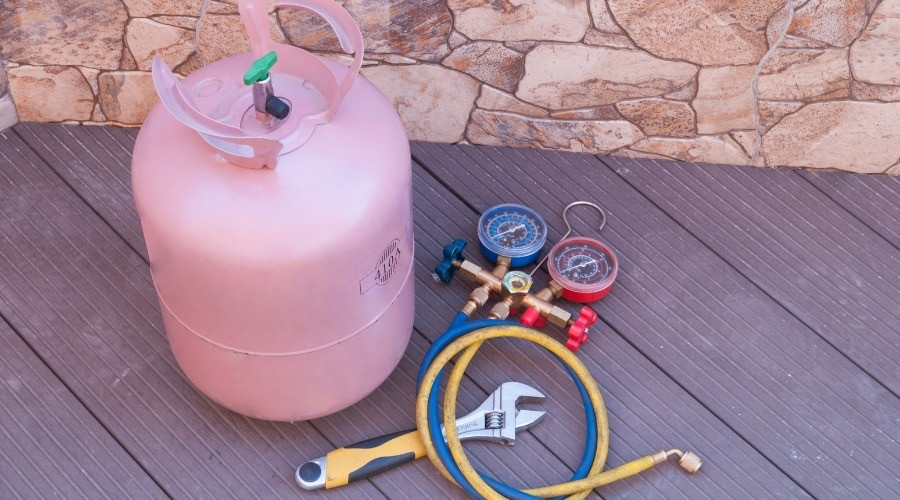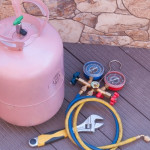Refrigerant and Signs of Refrigerant Issues
Refrigerant plays a vital role in the operation of air conditioning systems by enabling efficient heat transfer. A clear understanding of how refrigerant functions can help identify problems and avoid unnecessary energy costs. Many HVAC issues begin with refrigerant imbalances that compromise system performance. Learning how refrigerant works is a crucial step toward maintaining effective cooling.
How Refrigerant Works in an Air Conditioning System
Refrigerant cycles through a closed loop to move heat from indoor air to the outside environment. The liquid refrigerant first absorbs heat in the evaporator coil and transforms into vapor. This vapor is then compressed, increasing pressure and temperature before passing through the condenser coil, where it releases heat. The refrigerant returns to liquid form and re-enters the evaporator to repeat the cycle.
Proper refrigerant levels ensure efficient cooling and system longevity. A drop in refrigerant often results from leaks rather than normal use. This loss impacts heat transfer and can raise energy consumption significantly. According to the Environmental Protection Agency, leaks account for a large portion of air conditioning failures in residential systems.
Signs of a Refrigerant Leak or Overcharged Refrigerant
 Improper refrigerant levels cause noticeable performance issues such as warm air from vents and longer cooling times. Frozen evaporator coils often point to insufficient refrigerant. Strange sounds near the outdoor unit, like hissing or bubbling, may indicate a leak in the lines. These issues frequently lead to rising energy bills during peak usage months.
Improper refrigerant levels cause noticeable performance issues such as warm air from vents and longer cooling times. Frozen evaporator coils often point to insufficient refrigerant. Strange sounds near the outdoor unit, like hissing or bubbling, may indicate a leak in the lines. These issues frequently lead to rising energy bills during peak usage months.
Both low and excessive refrigerant levels create similar warning signs. Overcharging often results from improper service rather than gradual system failure. Excess refrigerant disrupts the heat exchange process and stresses components. Diagnostic tools are needed to confirm whether a system is overcharged or leaking.
Overcharging usually occurs during unqualified repairs or unsupervised top-offs. A high refrigerant level restricts airflow and reduces system efficiency. According to the EPA, many residential air conditioners operate with incorrect refrigerant amounts. Whether undercharged or overcharged, performance suffers, and only accurate testing can identify the true issue.
How to Avoid Refrigerant Issues
 Avoiding refrigerant problems begins with qualified HVAC servicing. Certified technicians follow strict procedures to charge systems properly. Accurate refrigerant levels depend on pressure readings, temperature checks, and manufacturer guidelines. Improper refills often damage components and lower efficiency.
Avoiding refrigerant problems begins with qualified HVAC servicing. Certified technicians follow strict procedures to charge systems properly. Accurate refrigerant levels depend on pressure readings, temperature checks, and manufacturer guidelines. Improper refills often damage components and lower efficiency.
Preventive care through scheduled maintenance detects issues before they grow into major failures. Regular servicing includes coil cleaning, leak detection, and system pressure evaluation. Technicians inspect all lines, valves, and connections to preserve refrigerant integrity. According to industry data, these practices reduce refrigerant-related failures by a significant margin.
Seasonal maintenance, performed twice a year, helps systems perform efficiently while extending their lifespan. Attention to refrigerant conditions protects against unexpected breakdowns and high repair costs. Proper refrigerant care not only prevents problems but also ensures dependable performance throughout the year.
Call AirLux Heating & Cooling
AirLux Heating & Cooling is a highly-rated heating and AC company serving Niles, MI, and the surrounding areas. They offer 24/7 live answers, trustworthy technicians, and on-time arrival. Call them for AC refrigerant leak repair services in Niles, MI.




